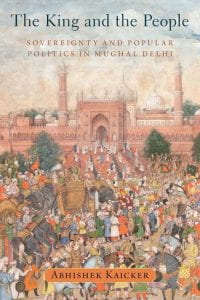History professor Douglas Haynes, along with co-editors Ajay Gandhi, Barbara Harriss-White, and Sabastian Schwecke have published a new edited volume called Rethinking Markets in Modern India: Embedded Exchange and Contested Jurisdiction with Cambridge University Press.
With contributions from David Rudner, Nikhil Rao, Projit Bihari Mukharji, Douglas E. Haynes, Sebastian Schwecke, Mekhala Krishnamurthy, Aditi Saraf, Andy Rotman, Ajay Gandhi, Matthew S. Hull, Roger Begrich, Barbara Harriss-White, and J. Jeyarangan the book is a rich addition to the literature on markets, capitalism, and exchange in South Asia.
The book description reads:
 “To people operating in India’s economy, actually existing markets are remarkably different from how planners and academics conceive them. From the outside, they appear as demarcated arenas of exchange bound by state-imposed rules. As historical and social realities, however, markets are dynamic, adaptative, and ambiguous spaces. This book delves into this intricate context, exploring Indian markets through the competition and collaboration of those who frame and participate in markets. Anchored in vivid case studies – from colonial property and advertising milieus to today’s bazaar and criminal economies – this volume underlines the friction and interdependence between commerce, society, and state. Contributors from history, anthropology, political economy, and development studies synthesize existing scholarly approaches, add new perspectives on Indian capitalism’s evolution, and reveal the transactional specificities that underlie the real-world functioning of markets.”
“To people operating in India’s economy, actually existing markets are remarkably different from how planners and academics conceive them. From the outside, they appear as demarcated arenas of exchange bound by state-imposed rules. As historical and social realities, however, markets are dynamic, adaptative, and ambiguous spaces. This book delves into this intricate context, exploring Indian markets through the competition and collaboration of those who frame and participate in markets. Anchored in vivid case studies – from colonial property and advertising milieus to today’s bazaar and criminal economies – this volume underlines the friction and interdependence between commerce, society, and state. Contributors from history, anthropology, political economy, and development studies synthesize existing scholarly approaches, add new perspectives on Indian capitalism’s evolution, and reveal the transactional specificities that underlie the real-world functioning of markets.”
Ritu Birla praises the book as follows:
Working across South Asian history and ethnography, this volume builds creatively on the existing literature on vernacular capitalism and market governance with rich data and diverse approaches to customary and underground transactions. Exploring finance, small-scale industry and agricultural commodities, as well as advertising, risk and trust, the essays delve deeply into the local contexts of market practice in India, productively reactivating debates on the temporalities, performatives and regulation of ‘the bazaar.’
— Ritu Birla, University of Toronto
and Thomas Blom Hansen writes:
India’s rise as an ‘emergent market’ in the global economy has prompted much hype around a ’new’ India. In this volume, anthropologists and historians of India demonstrate with great authority and insight that markets in India are old and deeply entrenched in complex social and cultural institutions. Anyone who wishes to understand the dynamism of contemporary Indian capitalism must understand such institutions and exchange relations and this volume will be a rich resource in this quest for scholars in many fields.
— Thomas Blom Hansen, Stanford University
Check out the publisher’s website to see the full table of contents and to read more advance praise for the volume.









